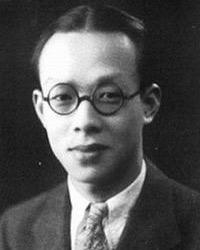Zhou Youguang
| Zhou Youguang | |||||||||||
|---|---|---|---|---|---|---|---|---|---|---|---|

Zhou in the 1920s
|
|||||||||||
| Native name | 周有光 | ||||||||||
| Born |
Zhou Yaoping 13 January 1906 Changzhou, Jiangsu, Qing Empire |
||||||||||
| Died | 14 January 2017 (aged 111 years, 1 day) Beijing, China |
||||||||||
| Alma mater |
St. John's University Guanghua University |
||||||||||
| Known for | Development of Pinyin; supercentenarian | ||||||||||
| Notable work | The Historical Evolution of Chinese Languages and Scripts | ||||||||||
| Political party | China Democratic National Construction Association | ||||||||||
| Spouse(s) | Zhang Yunhe (m. 1933; her death 2002) | ||||||||||
| Children | 2 | ||||||||||
| Chinese name | |||||||||||
| Chinese | 周有光 | ||||||||||
|
|||||||||||
| Birth name | |||||||||||
| Chinese | 周耀平 | ||||||||||
|
|||||||||||
| Transcriptions | |
|---|---|
| Standard Mandarin | |
| Hanyu Pinyin | Zhōu Yǒuguāng |
| Wade–Giles | Chou1 Yu3-kuang1 |
| IPA | [ʈʂóu̯ i̯òu̯ku̯áŋ] |
| Transcriptions | |
|---|---|
| Standard Mandarin | |
| Hanyu Pinyin | Zhōu Yàopíng |
| Wade–Giles | Chou1 Yao4-p'ing2 |
Zhou Youguang (Chinese: 周有光; pinyin: Zhōu Yǒuguāng; 13 January 1906 – 14 January 2017) was a Chinese economist, banker, linguist, sinologist, publisher, and supercentenarian, known as the "father of Pinyin", a system for the romanization of Mandarin Chinese, which was officially adopted by the government of the People's Republic of China in 1958, the International Organization for Standardization (ISO) in 1982, and the United Nations in 1986.
Zhou was born as Zhou Yaoping in Changzhou, Jiangsu Province, on 13 January 1906 to a Qing Dynasty official. At the age of ten, he and his family moved to Suzhou, Jiangsu Province. In 1918, he entered Changzhou High School, during which time he first took an interest in linguistics. He graduated in 1923 with honours.
Zhou enrolled the same year in St. John's University, Shanghai where he majored in economics and took supplementary coursework in linguistics. He was almost unable to attend due to his family's poverty, but friends and relatives fundraised 200 yuan for the admission fee, and also helped him pay for tuition. He left during the May Thirtieth Movement of 1925 and transferred to Guanghua University, from which he graduated in 1927.
...
Wikipedia
